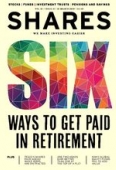Archived article
Please note that tax, investment, pension and ISA rules can change and the information and any views contained in this article may now be inaccurate.
Many global equity funds fail to add value

Three quarters of actively-managed funds with a global equity mandate have underperformed the MSCI World index since 11 November 2010, according to data from Trustnet.
Put another way, buying a passive exchange-traded fund tracking this index, which covers mid and large cap stocks from 23 countries, would have been one of the most rewarding ways of playing this market.
The IA sector average total return over this period was 105.2% versus 146.1% from the MSCI index. This outcome may surprise readers who are used to tapping into the services of fund managers to play global markets.
It goes to show that passive products shouldn’t be dismissed and it also acts as a reminder to check whether any actively-managed fund in your portfolio is really adding value.
The starting point for this research exercise is important as 11 November 2010 was when Fundsmith Equity (B41YBW7) was launched. This fund has become very popular for good reason: it is the best performing fund in the IA Global category since that date with a 311.7% total return.
If you re-run the data from 11 September 2017 you will find that two thirds of funds in the IA Global category underperformed the MSCI World index – the latter delivering an 8.3% total return versus the 6.5% average from IA Global category. That date marks the launch of Blue Whale Growth Fund (BD6PG56) which has subsequently become one of the best performing funds in its category.
Blue Whale fund manager Stephen Yiu argues there are too many underperforming funds on the market and something has to be done about it such as relegating the worst to a lower league. He boldly claims that Fundsmith and Lindsell Train Global Equity Fund (B3NS4D2) are the only true competitors to Blue Whale in the IA Global category.
‘We’ve all got highly concentrated portfolios, all with high conviction. Investors who don’t want a passive product really have two choices – they either buy a global fund with a 75 stock portfolio or split their investment across Fundsmith, Lindsell Train and Blue Whale. I think you would do better with the latter approach,’ says Yiu.
Interestingly its ascent comes at a time when Fundsmith is growing to become a gigantic monster worth £17.5bn. Its concentrated portfolio approach means that the bigger it gets, the higher up the market cap spectrum it has to go to invest if the money is spread out fairly equally. One could suggest it may soon reach a point where it doesn’t want any more money to manage and could soft close its fund. Yet that seems unlikely.
A spokesperson says Fundsmith has 27 stocks with an average market capitalisation approaching £100bn, adding: ‘If we owned 1% of each company – not a particularly illiquid position – the fund would be some £27bn, so much bigger than it is now.’
Blue Whale is tiny compared to these two other funds although it is now running £100m of assets versus £25m at launch, achieved through a mixture of new inflows and market gains. It has achieved 24.2% total return since launch 18 months ago. This top quartile performance has certainly helped it to grab the market’s attention although investors will need to wait for another few years to assess whether its gains were down to luck or skill.
Important information:
These articles are provided by Shares magazine which is published by AJ Bell Media, a part of AJ Bell. Shares is not written by AJ Bell.
Shares is provided for your general information and use and is not a personal recommendation to invest. It is not intended to be relied upon by you in making or not making any investment decisions. The investments referred to in these articles will not be suitable for all investors. If in doubt please seek appropriate independent financial advice.
Investors acting on the information in these articles do so at their own risk and AJ Bell Media and its staff do not accept liability for losses suffered by investors as a result of their investment decisions.

 magazine
magazine









